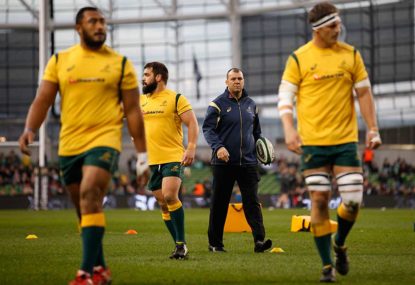Eugene Yang
new author
Roar Rookie

When I first came to Australia in the year 2000, I was an overgrown, eight-year-old Chinese boy with a Canadian accent, who winded up at a private school in the heart of Perth. Needless to say, those first few years were difficult.
Here are just two general exchanges which I would often go through.
“Where are you from?”
“Singapore.”
“Why do you talk like an American?”
“Because I lived in Canada.”
“But that’s not America!”
“Why are you so tall?”
“I don’t know.”
“Are your parents tall?”
“No.”
“Asians aren’t supposed to be tall.”
Clearly, I was doing it wrong. In the plainest terms possible, I didn’t make sense back then, to the other kids or to myself.
My body, my voice, and my own sense of identity were almost comically disjointed, and were continuing to drift away in different directions as time went on.
My accent prevailed between my sisters and myself at home, the lack of chicken rice and fried kway teow in this country made me miss the country of my birth, and, to my parents’ delight, I kept growing taller despite my age and (supposedly) my ethnicity.
Credit to my classmates, I’m no longer what you would call tall. I’m only 5’11”, but haven’t grown an inch since I took up rugby, and I took up rugby when I was 11. That was honestly the best decision I’ve ever made in my life.
On a rugby field I made sense. I could fun faster than the others because my legs were longer, I could push through them because I was heavier, my accent that stuck out was an asset rather than a liability. All those disjointed bits fell into place. Rugby allowed me to make sense.
In time, the other kids grew and caught up to me and we became teenagers. I lost my accent and became Australian in more ways than I ever thought I would.
As I changed, my experience of rugby changed. It became a place where life became simple amidst the shit of school and growing up. It became a 70-minute space every week where all that mattered in life was moving a ball behind a white line in the grass, and where test results, family fights, and girlfriends that never worked out could so easily be put on hold.
Now I’m 22 and living away from my family on the opposite side of the country, and further from Singapore than ever before. But rugby has stayed the same. Rugby is still with me. Rugby has been the constant of my life since the day I took it up, and I could not be any more grateful for having found this sport at the time and way that I did.
I’d like to think that was up to chance, but I’m not sure if it was. At the end of 2003, the Rugby World Cup had just wrapped up in Sydney, and Australia had just had its heart broken by the world’s most famous left boot (in this sport at least).
But still, the spectacle had inspired us kids to take up the game wherever and whenever we could, no matter how many matches were shut down and detentions copped for tackling at lunch time.
So where does all this reflection lead? It leads me to realise what I actually talk about when I talk about rugby.
When I talk about rugby I talk about more than a sport. I talk about something that is an inseparable part of me, something that has made me what I am today, something that I love with all my heart and something that I feel indebted to for all it has done.
When I talk about rugby I talk about it with a hope that this game can grow and do the same for children – both boys and girls – all around the world, where the game is entrenched in local culture or still growing. I know that if the World Cup had never swung by Australia in 2003, I might not be here, writing this article as the person I am.
Far from its glory days in the 1990s and early 2000s, Australian rugby is, at the moment, in a tricky situation at best.
Financial struggles within the ARU, its never-ending contest with the AFL, NRL and A-League, the Wallabies’ fall in the world rankings, coaching conflicts, and the challenge of Euros and Yen to Australia’s playing stocks and, implicitly, their pride in and passion for the gold jersey itself, have far outweighed the few positives of a revived domestic competition, the Waratahs’ Super Rugby title, and the form of a handful of players who are, or could be, world class.
This goes without mentioning, of course, that the World Cup that will soon come barrelling through the rugby world magnifies the importance and urgency of these issues exponentially.
So things aren’t the best. We know that. But I know that we wouldn’t all be here, as fans or as players, if there wasn’t something about this game that we know, we love, and we believe in. I’ve explained mine, and I invite all of you to not necessarily share, but to reflect on yours.
We all talk about different things when we talk about rugby. Maybe figuring out what that is, be it as juniors, as clubmen, as supporters, and indeed, as Wallabies, will be a necessary first step in bringing it back into the spotlight that we all know it deserves, so it can continue to work the magic we all know it can.